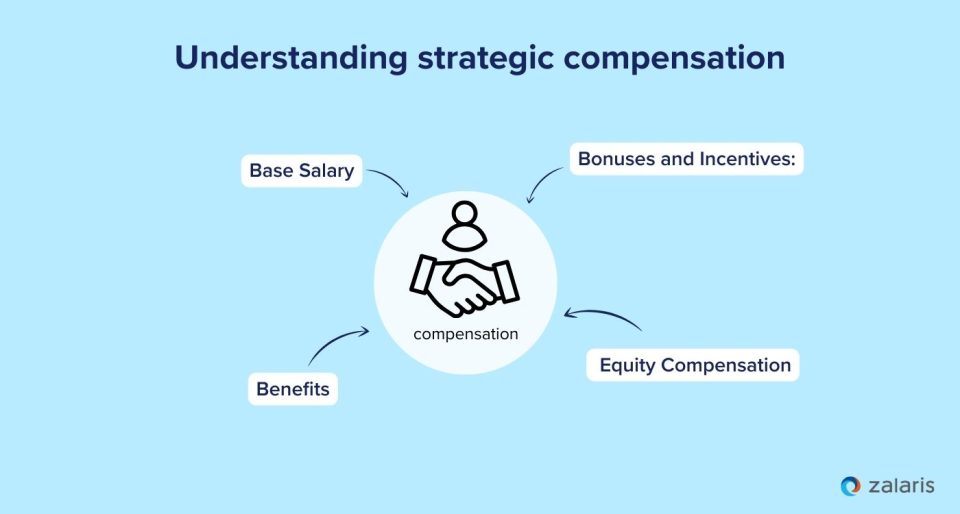When employees feel valued, respected, and fairly compensated, they are more likely to remain committed to their roles and contribute their best efforts. This translates into higher productivity levels, better quality of work, and increased efficiency, ultimately driving profitability and growth for the organisation.
Retaining top talent is essential in today’s competitive job market. High employee turnover can be costly, both in terms of recruitment expenses and the loss of institutional knowledge and expertise. By prioritising employee satisfaction and implementing effective retention strategies, companies can minimise these costs and maintain a stable, skilled workforce.
The cost of losing an employee can range from tens of thousands of dollars to 1.5-2 times their annual salary.
– Josh Bersin
Understanding strategic compensation
An organisation’s compensation policies, methods, and programs can be designed and implemented with a holistic approach called strategic compensation. By coordinating pay plans with the organisation’s overarching objectives, core values, and labour requirements, it plays a critical role in improving employee satisfaction and retention.
Strategic compensation encompasses various components that collectively contribute to an employee’s total rewards package. These components include:
1. Base Salary: This is the fixed compensation an employee receives for performing their job responsibilities. Base salaries are typically determined based on factors such as job responsibilities, experience, qualifications, and market rates.
2. Bonuses and Incentives: These are variable compensation elements tied to individual, team, or organisational performance. Bonuses and incentives can motivate employees to achieve specific goals and contribute to the company’s success.
3. Benefits: Employee benefits can include healthcare coverage, retirement plans, paid time off, and other perks that enhance an employee’s overall well-being and financial security.
4. Equity Compensation: Many companies offer equity-based compensation, such as stock options or restricted stock units, to align employee interests with the company’s long-term success and foster a sense of ownership.
By strategically combining these components, organisations can create a compelling total rewards package that not only attracts and retains top talent but also motivates employees to perform at their best. Strategic compensation considers factors such as market competitiveness, internal equity, and employee preferences, ensuring that compensation strategies are tailored to the specific needs and goals of the organisation and its workforce.

Tailoring compensation to employee preferences
An all-encompassing strategy for remuneration is no longer viable in the diverse workforce of today. Pay packages may be effectively customised to accommodate the unique demands, goals, and preferences of employees, since this can significantly increase job satisfaction and retention.
Offering customisable compensation packages allows employees to choose the benefits and perks that align with their unique circumstances and values. For example, some employees may prioritise flexible work arrangements, such as remote work or flexible schedules, to achieve a better work-life balance. Others may value professional development opportunities, such as tuition reimbursement or access to training programs, to enhance their skills and advance their careers.
By providing a range of options, employers can cater to the diverse needs of their workforce. This not only enhances employee satisfaction but also demonstrates a commitment to their well-being and personal growth, fostering a sense of appreciation and loyalty.
Non-monetary compensation and recognition
While monetary compensation is a significant factor in employee satisfaction and retention, non-monetary rewards and recognition can play an equally crucial role. These non-financial incentives can foster a sense of purpose, appreciation, and personal growth, ultimately leading to higher levels of engagement and loyalty.
One powerful non-monetary strategy is implementing robust recognition programs. These programs acknowledge and celebrate employee achievements, milestones, and exceptional contributions. Providing simple gestures like verbal praise and awards can significantly boost employee satisfaction and appreciation, while peer-to-peer recognition platforms can further foster a positive work environment.
Work-life balance initiatives are another effective non-monetary approach. Offering flexible work arrangements, such as remote work options, flexible schedules, or generous paid time off policies, can significantly improve employee satisfaction and reduce burnout. These initiatives demonstrate that the company values its employees’ well-being and respects their personal lives, fostering a sense of loyalty and commitment.
Fostering a positive company culture, promoting open communication, and embracing diversity, can enhance employee satisfaction, engagement, and retention by contributing to non-monetary employee satisfaction. This holistic approach not only attracts top talent but also fosters a highly engaged and loyal workforce, ultimately driving long-term success and competitiveness.
Know more on the topic
Aligning compensation with company culture and values
Compensation strategies that align with a company’s core culture and values are instrumental in fostering a sense of purpose and belonging among employees.
LinkedIn’s study of 10,000 professionals worldwide reveals that 68% of workers in the UK, France, Germany, and Ireland now value working for companies that align with their values. When employees perceive a strong connection between their work, the compensation they receive, and the organisation’s mission and principles, they are more likely to feel engaged, motivated, and committed to their roles.
By aligning compensation with company values, organisations can reinforce desired behaviours and encourage employees to embody the principles that define the organisational culture. This approach not only attracts like-minded individuals during the recruitment process but also helps retain top talent by fostering a sense of belonging and purpose.
Transparently linking compensation strategies to company values enhances employee awareness of their contributions’ impact on the organisation’s success, resulting in increased job satisfaction.
The future of compensation and employee engagement
As the workforce evolves and new generations enter the job market, compensation strategies must adapt to meet changing expectations and preferences. Emerging trends and innovations in compensation and employee engagement are poised to reshape the way organisations approach rewards and recognition.
Personalised rewards are increasingly popular as organisations can offer a range of incentives tailored to individual preferences, enhancing employee satisfaction and demonstrating a commitment to understanding and valuing their workforce, rather than a one-size-fits-all approach.
The integration of technology and data analytics is also transforming compensation strategies. By leveraging Zalaris Compensation Planning solution, organisations can gain insights into employee behavior, performance, and preferences. This data-driven approach enables organisations to make informed decisions about compensation packages, ensuring they are competitive, fair, and aligned with business objectives.
As the future of compensation and employee engagement unfolds, organisations must remain agile and adaptable. Continuous evaluation and refinement of compensation strategies will be crucial to attracting, retaining, and motivating top talent in an increasingly competitive and dynamic job market.

